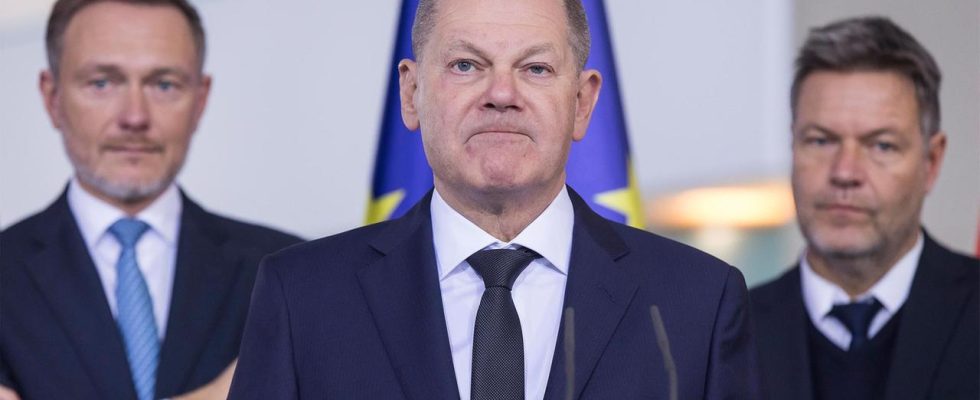analysis
The complicated 2024 budget is at least agreed upon within the traffic light factions in the Bundestag – to everyone’s satisfaction. But further dissonances are already emerging.
Whether the traffic light coalition will manage a decent, but also properly shrunken, federal budget for 2024 after the Federal Constitutional Court’s ruling – and with what injuries: That was more than a question of fate in advance. It became a litmus test for the crisis-ridden government.
This has now been achieved within the traffic lights, especially after the joint parliamentary corrections and the adjustment meeting. But the budget week wasn’t over yet, as new stumbling blocks appeared again: at the very last minute, two FDP ministers raised concerns about the implementation of the EU Supply Chain Directive, which, after years of preparatory work, is currently in the final phase at EU level . The search for saving compromises is now frantically behind the scenes.
Open self-criticism
Actually, a lot of things should be different. Chancellor Olaf Scholz vowed to make improvements and, in a recent conversation with “Zeit,” even admitted shared responsibility for the traffic light coalition’s often discordant behavior.
SPD parliamentary group leader Rolf Mützenich practiced open and depressing self-criticism on Wednesday in the Bundestag’s general debate on the budget: “I have to admit that our behavior in the coalition has sometimes caused frustration and concern.” That is negligent – “and that saddens me too.”
The coalition allowed “our differences to unfortunately be attributed to democracy as such,” said Mützenich. This has to stop. It could be interpreted as an appeal to the two smaller coalition partners, especially the FDP.
Questions about the debt brake
But a few minutes later, a self-confident FDP general secretary came to the lectern to lecture the previous speaker Mützenich: “For us, the taxpayer’s money is not just any distribution material,” shouted Bijan Djir-Sarai in the direction of the SPD.
He criticized his traffic light colleague from the largest government faction head-on because he had made the Union an offer to talk about “circumventing the debt brake” in the plenary session. “I find that remarkable, dear Rolf.” Mützenich smiles away at that moment. But it’s clear that he would prefer to avoid dealing with things like this within the coalition.
The SPD parliamentary group believes that the debt brake in its current form is no longer up to date. She is serious, and so is the Green Party. Even the so-called economic experts, the Economic Advisory Council made up of economists, are calling for a reform of the debt brake.
Additional pressure to act due to strong AfD
This major budget instrument anchored in the Basic Law can only be addressed with a two-thirds majority, as can better protection for the Federal Constitutional Court. And this two-thirds majority from democratic parties now exists – we don’t know whether it will still exist after the next federal election.
The scenario of a possible strengthening of the AfD in the 2025 federal election puts the current federal government under additional pressure to act in order to strengthen previously democratic institutions. More than perhaps the traffic lights themselves had predicted when the coalition agreement was signed.
Lindner is “ampelig”
For the SPD and the Greens, this also includes a reform of the debt brake. But Finance Minister Christian Lindner once again rejected this request – and at the same time used very “light” language when presenting the federal budget on Tuesday: “I’m not talking about an austerity budget, but rather a creative budget.” The FDP leader also did not skimp on attacks on the Union faction. But that alone doesn’t create a more uniform appearance.
Visible reaction to this contradictory appearance by the finance minister: At the end of Lindner’s speech on Tuesday, two of three SPD top politicians in the front row of the SPD parliamentary group simply did not clap at all – Mützenich and Katja Mast, the parliamentary group manager. Only her neighbor, SPD budget politician Dennis Rohde, applauded politely.
The three budget politicians Rohde, Otto Fricke (FDP) and Sven-Christian Kindler (Greens) were noticeably proud and satisfied during their final speeches in the Bundestag – and thanked each other for fairness and cooperation. In the end, sensible solutions emerged that everyone could live with.
The three politicians have long stood out as a counter-model to the disputes in the coalition by being fair, constructive and secretive in deliberations – actually a model for how the traffic light coalition originally wanted to deal with each other.
What construction sites are still waiting for the alliance?
There are many construction sites awaiting the three-way alliance this year, where differences are currently noticeable. The debate about climate money shows this. Its importance as a compensation payment for citizens is also emphasized by SPD state leaders.
Economics and Climate Protection Minister Robert Habeck, in turn, is promoting a new special fund to solve structural problems. For this, too, he would not only need Lindner, but also the Union. He is supported by economists such as Jens Suedekum, Michael Huether and Clemens Fuest, who developed this proposal.
When it comes to tax policy, the SPD parliamentary group disagrees with Lindner when it comes to adjusting the child allowance – without increasing child benefit again. In the general debate, Mützenich clearly distanced himself from Lindner on the cabinet bench. There could be new trouble regarding the entire 2025 federal budget. There is already a gap of 15 billion euros there.
It looks as if the traffic light coalition has no time to take a breather and enjoy the test of the budget agreement. She still seems to be looking for the right way to find, despite all the differences, workable compromises in a somewhat quieter manner – and to explain them even better than in the first two years of government cooperation.
Martin Polansky, ARD Berlin, tagesschau, February 2nd, 2024 8:07 a.m

